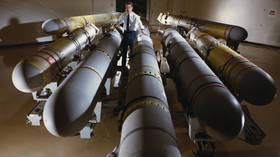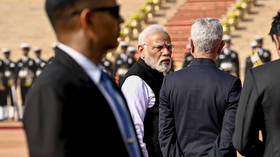‘US working on behalf of Al-Nusra terrorists in Syria’

Al-Nusra has been on the US terrorist watch list since 2012, Karen Kwiatkowski, retired US Air Force Lieutenant Colonel, told RT. Asking Russia not to bomb it, is indicating that US is in working on behalf of the extremist organization, she added.
Al-Nusra terrorists Saturday launched a heavy artillery attack on residential areas of Aleppo. At least 40 people were killed and more than a hundred injured, according to the Russian ceasefire monitoring center on the ground.
RT: The US asked Russia not to bomb Al-Nusra. Does that seem like a strange request?
Karen Kwiatkowski: It does, considering Al-Nusra is still on the terrorist watch list and has been since 2012, as I understand it. So it is a very obvious case of the US working on behalf of a terrorist group that the US itself has recognized. It is not a very clear policy. Very confusing.
RT: Some argue that these groups intermingle, so it is very difficult to distinguish between them. How difficult is it to keep these groups apart?
KK: It appears to be very difficult. Certainly if you look at the role of defense of civilians, which I think is something that both the US and Russia and all parties are interested in – defense of civilians – if you are defending them, you really are not going to worry about intermingling. If fire is coming, if violence is emanating from a particular source, that is going to be your target. That is almost a very simple thing that is being made complicated by claims from these folks in offices back in Washington. They are very academic about their evaluation, but in fact if people are being harmed and they are to be defended you don’t stop and worry about intermingling. I am sorry, but it doesn’t work that way.
RT: Are you surprised that the US doesn’t seem to be able in some way to influence these groups that are intermingling with Al-Nusra?
KK: I think they are operating on really bad information. The State Department and even the Pentagon to the extent that it may be involved here, has really typically bad information about who our allies are and how much of an ally they might be. So when Washington, when the State Department talks about separating our fire, or treating one group a little bit differently than another group and putting out the word to our so-called allies, I think they are living in a fantasy world; their data is probably bad data – I don’t think it’s current. And it is really an excuse. You got to remember the Obama administration is a lame duck administration – they don’t have time to change the strategic course of their foreign policy in the Middle East and in Syria, they don’t want to. So there is no energy there to do something that might actually improve the situation. They’re just basically holding the line and waiting out the administration’s end of term. The State Department is really saying nothing. When it says: “They’re intermingling. We want to talk to them, give us time,” that is very empty language.
The statements, views and opinions expressed in this column are solely those of the author and do not necessarily represent those of RT.













